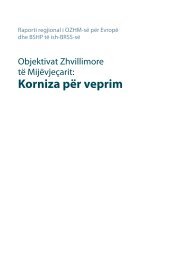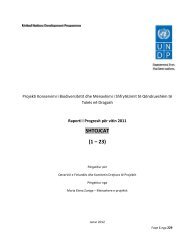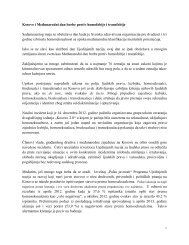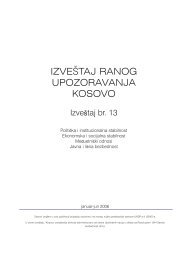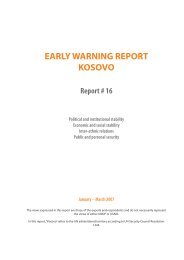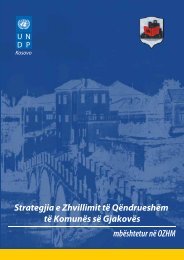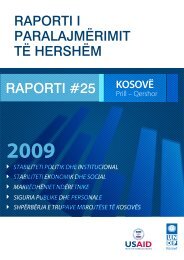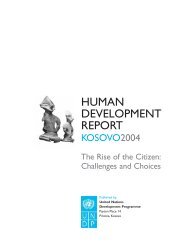Kosovo Human Development Report 2010 - UNDP Kosovo - United ...
Kosovo Human Development Report 2010 - UNDP Kosovo - United ...
Kosovo Human Development Report 2010 - UNDP Kosovo - United ...
Create successful ePaper yourself
Turn your PDF publications into a flip-book with our unique Google optimized e-Paper software.
incomes, pregnant women and<br />
new mothers among the <strong>Kosovo</strong>-<br />
RAE and other low-income groups.<br />
(ii) Tailor health information strategies<br />
to the most excluded, working<br />
at local level with other sectors<br />
• Implement locally-targeted public<br />
health campaigns: since health<br />
exclusion has many very specific<br />
local manifestations, local health<br />
mobilization and information campaigns<br />
should be developed to increase<br />
health promoting and health<br />
seeking behavior, as well as improving<br />
the quality of service delivery.<br />
Health information systems must<br />
be developed in such a way that<br />
socially excluded groups can both<br />
participate in their propagation and<br />
absorb critical facts. Municipal-level<br />
campaigns should ideally be crosssectoral,<br />
conducted in partnership<br />
with other local authorities (for example,<br />
Environment and Spatial<br />
Planning, Labour and Social Welfare<br />
and Education, Science and Technology),<br />
and other non-traditional<br />
partners including the private sector<br />
(e.g. industry, coffee houses, hairdressers<br />
etc) and civil society.<br />
• Focus on preventative care: more<br />
funding should be allocated for preventive<br />
health care programmes<br />
where high-risk groups are identified,<br />
in order to improve health<br />
outcomes and reduce costs in the<br />
long-run.<br />
(iii) Earmark special programmes for<br />
the excluded<br />
• Develop special health projects<br />
76 | KOSOVO HUMAN DEVELOPMENT REPORT <strong>2010</strong><br />
specifically for and with poor<br />
and rural women, children, youth<br />
and <strong>Kosovo</strong>-RAE: raising the basic<br />
health levels of these most excluded<br />
groups should be a development<br />
priority for <strong>Kosovo</strong> and all its<br />
international partners. Special projects<br />
should be identified to support<br />
their access to primary health care<br />
services, basic quality reproductive<br />
health care services, maternal<br />
and child health and nutrition services<br />
(particularly to increase exclusive<br />
breastfeeding, youth-friendly<br />
health services and emergency<br />
care). The MOH should also provide<br />
earmarked funding for projects targeting<br />
critical and chronic health<br />
problems – such as long-term lead<br />
poisoning among <strong>Kosovo</strong>-RAE families<br />
in Mitrovicë/Mitrovica – and<br />
provide more transfers to poor municipalities<br />
where health challenges<br />
are more significant.<br />
• Implement legislation for the disabled:<br />
<strong>Kosovo</strong> should accelerate its<br />
implementation of the National Disability<br />
Action Plan for the Republic<br />
of <strong>Kosovo</strong>, 2009-2011 and report<br />
on its progress on an annual basis.<br />
Some priority areas that should be<br />
addressed include: implementation<br />
of additional health services for persons<br />
with disabilities to be included<br />
in the basic package of care (from<br />
early diagnostic to rehabilitation),<br />
provision of assistive devices for persons<br />
with disabilities and improving<br />
accessibility of healthcare providers.



